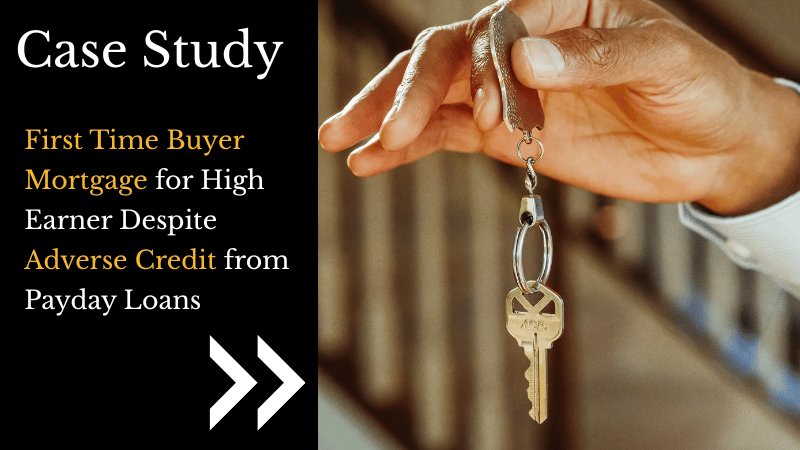Categories
Mortgages and Credit Scores: What You Need To Know

When it comes to getting a mortgage, one of the biggest questions is always ‘will I be accepted’? At Clifton Private Finance, we know that understanding how lenders evaluate you for your application helps provide confidence and assurance - as well as giving you a plan to fix any problems to ensure success. At the core of that is your credit score.
Our experts are here to delve into how your credit history affects your mortgage application.
Key Takeaways
- Your credit history is the first thing lenders see when evaluating you for a mortgage.
- Time and patience can heal even the worst credit rating.
- Careful credit management and repayment responsibility are key to growing your credit score.
- Your credit score affects more than just your mortgage acceptance.
- Clifton Private Finance can help you get a mortgage, whatever your credit report.
Get a free mortgage comparison tailored to your credit situation:

What is Your Credit Score?
Your credit score (or credit rating) is a number that represents how well you manage your finances. It’s calculated by taking several variables such as whether you’ve missed a repayment or how close you are to your credit card limits, and uses that information to generate a final score.
In the UK, there are three main credit rating agencies (CRAs) that the lenders trust when they’re evaluating you for your mortgage, these are Experian, Equifax, and TransUnion. It’s worth noting that each of these agencies will have a slightly different score for you, due to the individual ways they balance their scoring system.
Each lender will have a preferred CRA they use. For most people, this doesn’t make much difference, but if you are close to getting a mortgage then talking to us to match you to a lender who checks with the right CRA can be an effective way of getting that final boost.
How is Your Credit Score Calculated?
There are many variables that go into calculating your credit score, and each of the CRAs holds slightly different data, so there’s no definitive answer to understanding exactly how your credit score is calculated. Instead, it’s helpful to understand how your history affects that calculation:

Payment history - One of the primary factors is whether you are reliable in how you manage your bills. Your payment history shows whether you have made your payments on time, compiling information from sources such as credit cards, loans, car finance, and mobile phone contracts. One omission from your credit score payment history that can frustrate prospective first-time buyers is that there is typically no log of your rent payments. If you have been dedicated to maintaining years of paying your rent on time, it can feel frustrating that it’s not boosting your credit score; however, the private nature of most rental agreements means it’s simply not possible to include in most circumstances.

Credit utilisation - The amount of your available credit you are using forms a central part of your credit score. Maxing out credit cards will significantly impact your credit score, while having available credit but not using it, represents careful money management and lower risk. Credit utilisation is best kept under 30% for an optimum score.

Length of credit history - Your credit history begins once you turn 18, or when you first come to the UK as an adult. Having a longer credit history is helpful, as it provides information to be analysed. For a lender, someone with no credit history is seen as a greater risk than someone known, even if there’s the odd missed payment or stretched credit.

Number of recent applications - When you make a final application for credit, the lender will make a ‘hard’ search on your credit report, which will leave a mark. Too many applications in a short time will make you seem desperate and quickly lower your credit score. Waiting between credit applications is important.

Bankruptcies and CCJs - Serious financial interventions that are part of the public record will negatively impact your credit score. These include County Court Judgements (CCJs), Individual Voluntary Arrangements (IVAs), bankruptcy, or other financial legal actions.

Identity and general stability - Lenders will consider you a smaller risk if you have stability in your life. This includes being registered on the electoral roll and moving infrequently. These factors are of lower impact than others, but can make all the difference on a mortgage application.
What’s Not There
Not everything forms part of your credit history. Some examples of information that doesn’t find its way to your credit report include:
- Rent payments - As mentioned, private transactions such as rent do not impact your credit rating.
- Council tax - Regular council tax payments are not logged, though if you default heavily on your council tax and it enters debt recovery, a CCJ may be issued in your name which will significantly harm your credit score.
- Income - Your income is private and is not included in your credit history.
- Tax status - Like income, your tax band is excluded.
- Card-based subscriptions and transactions - Buying things on your credit and debit cards won’t show. This includes subscription services, such as TV streaming and software subscriptions etc.
- Private loans - Money owed to friends and family will not form part of your credit history.
How to Improve Your Credit Score
On the face of it, improving your credit score seems obvious - manage your finances well! However, there are some key methods that will give you the greatest chance of meeting mortgage lender expectations.
Have Patience
By far, the greatest healer of your credit score is time. If you have had some troubles in the past, good money management going forward will gradually dismiss them to distant memory.
- Don’t rush applications - Wait a few months before applying for a mortgage if you’ve recently got a loan or new credit card so you don’t look desperate.
- Prioritise payments - While you are healing your credit report, keep an eye on all important payments and direct debits and make sure they don’t bounce.
- Monitor your credit - You can see your credit score online, either through the main CRAs websites, or with third-party tools. It’s free to do so. Keeping an eye on your score helps you make informed decisions.
Lower Your Credit Utilisation
Concentrate on existing overdraft and credit card payments, making sure to spend less each month that you’re paying back so that you gradually lower your credit use. If you can make a big payment to knock a credit card back from being maxed out, then it’s worthwhile. Note that credit utilisation is based on revolving lines of credit, such as overdrafts and credit cards, and not loans or other contractual obligations (such as mobile phone contracts and car finance).
Consolidate Debt
While taking out more debt may feel counterintuitive, well-managed debt consolidation will get you on track with your credit report. Consider:
- A lower-interest loan to repay existing high-interest credit card or other debt.
- Using zero-percent balance transfer credit cards to give yourself some breathing space.
When you consolidate the debt, you help your monthly cash flow and administration but lowering the amount you’re paying in interest and bringing everything together in one easy payment.
Debt consolidation has to be well managed to avoid further problems and isn’t as simple as ‘pay off credit cards and cut them up’. You will need to avoid using your credit cards to make sure you don’t slip into greater amounts of debt, but it’s also worth keeping them available to improve your credit utilisation percentage.
Speak to a debt consolidation expert at Clifton Private Finance for more help.
Stay Up-to-Date and Check for Errors
CRAs are not perfect, and they rely on data from a range of sources. Making sure you keep information up-to-date and check for any errors is a key part to maintaining a strong credit score.
This includes:
- Registering for the electoral roll - Simple and easy and a quick boost to your credit score that improves over time.
- Checking linked accounts - If you have joint accounts then they will show on your credit report and will affect it accordingly. Often links remain even after the accounts are closed and relationships between you have ended. Make sure you are not being adversely impacted by an old connection.
- Checking for fraud or errors - Both fraud and mistakes do happen and can seriously harm your credit history. If you see anything that is out of place, you should question it immediately.
The CRAs have standard reporting tools to query any details; use these to feed back if anything on your credit report is incorrect.
Credit Rating vs. Affordability
When mortgage lenders make their assessment, your credit score is not the only way they assess your finances. The other main consideration is affordability.
It is possible to have an excellent credit score but poor affordability, leading to an unsuccessful application. Similarly, you might be rejected despite strong affordability because of a bad credit history.
Affordability is an assessment of your income against your expenses, to see if you have enough money each month to comfortably cover the mortgage payments.
To understand more about affordability and how it is used for the final mortgage decision, read our article How Mortgage Affordability Checks Work.
Mortgages and Credit Score
Your credit score will affect more than just the simple ‘yes’ or ‘no’ of an application. Here’s where mortgage lenders use your credit information in determining your mortgage.
- The Agreement in Principle - The first step to getting your mortgage is the agreement in principle (AIP). This early mortgage agreement is used to shop around for your new home, with a firm budget in mind. Your credit score is the primary information mortgage lenders use to make the AIP offer, and is extremely important at this very early stage, where other information, such as your income, is taken on trust.
- Deposit - Applicants with a poor credit score will often be asked for a larger deposit for their mortgage. This can require saving for many thousands of pounds if your credit score is below average, so it is often worth taking the time and financial investment to improve your score before your application, knowing you’re saving on the deposit by doing so.
- Mortgage Rate - Your credit score will have an impact on your mortgage interest rate, with significantly better rates available for those with strong credit histories.
- Range of Offers - Applicants with good credit ratings will have a wide range of lenders and products to choose from, giving you more flexibility and fewer fees when your credit score is positive.
- Complexity of Application and Underwriting - Obtaining the mortgage can become more complicated and take longer when your credit rating is poor. You may be asked for additional documentation or even need a guarantor.
- Final Decision - Your credit score will ultimately make a huge impact in whether or not your mortgage is approved.
At Clifton Private Finance, we work with the whole market of UK mortgage lenders, opening the doors to a wider range of mortgage products that can help you get on the property ladder even if your credit is poor. Speak to one of our specialist team about bad credit mortgages to understand your options and get the mortgage you’re after.
Why Keeping a Good Credit Score Matters
Many people put a great deal of effort in with their credit score in the months leading up to a mortgage, and then relax somewhat afterwards, no longer keeping an active eye on the report once everything is in place and you’ve moved into your new home.
Unfortunately, this can be a mistake that leads to complications and disappointment later on.
A mortgage is not a one-time application-and-done process. As a long-term financial product that last for many years, your mortgage needs regular review. Once your initial fixed term is over (often two or five years), you will need to choose to either stay with your current lender and their product transfer mortgage, or try to improve your position with a remortgage from another lender - in both cases, your credit score will yet again come into play.
Just as when you first get a mortgage, remortgaging involves a full assessment of your finances. This underwriting process will put your credit rating at its centre, and your score will affect the range of products available to you and the rates you can get. If you’ve spent the intervening years forgetting about your credit report and letting your financial diligence slip away, you could find that the honeymoon period for your mortgage, achieved through a strong credit rating, is over, and your monthly mortgage repayments could shoot up as a result.
Of course, the opposite is also true. If you have taken the time to keep up with your financial obligations - including your mortgage payments - then you may have improved your credit score, allowing you to get a better deal and enter the next stage of your mortgage with lower monthly outgoings.
Second-Charge ‘Homeowner’ Loans
Maintaining a good credit rating will also open you up to second-charge finance on your home. As you pay back the mortgage, you build up equity in the property that can be used as security for significant homeowner loans in the future.
Just as with a remortgage, a second-charge loan will involve a thorough examination of your credit history, with a good credit score providing better interest rates, a wider range of lenders and options, and greater flexibility.
With most home renovations and improvements done through either a remortgage or second-charge homeowner loan, keeping a good credit score gives you more flexibility when keeping your house in top condition - improving your enjoyment of your home and boosting its market value for when you come to sell.
Specialist Mortgages with Clifton Private Finance
At Clifton Private Finance, we have the expertise you need to get the mortgage of your dreams. Our advisors will work with you, discussing your credit score in detail to work out a plan to obtain the best possible mortgage rates. Whether you are already in a great position, able to move forward without delay, or if you need to consider a long-term plan for a future mortgage, we are here for you.
With our premium access to specialist lenders who will consider you for a mortgage even with a sub-par credit score, and understanding of lenders’ requirements, choosing Clifton Private Finance gives you the greatest chance of mortgage application success. Call us today.











